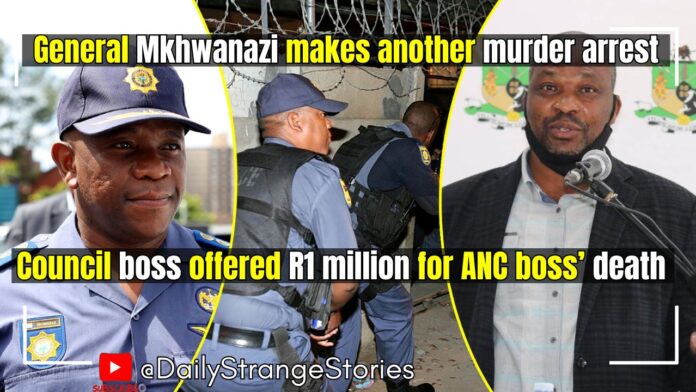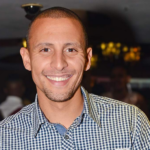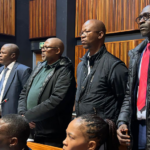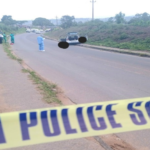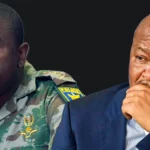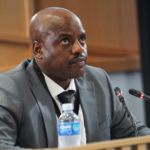In the corridors of South African politics and law enforcement, a race against the clock is unfolding. General Nhlanhla Mkhwanazi, the police commissioner of KwaZulu-Natal province, leads a special task team focused on political and high-profile killings, and they are moving quickly to make key arrests. This push comes just as a major Commission of Inquiry is about to begin its work, examining claims of deep corruption and criminal ties within the police and government. One of the latest actions by this team happened this week, with the arrest of a 55-year-old man linked to the murder of Sindiso Magaqa, a former secretary-general of the ANC Youth League. This arrest, carried out in Malvern, Durban, adds to a series of moves that show the team's determination to uncover truths before the inquiry takes over.
The suspect, Zweliphansi Skhosana, who once held a senior position as municipal manager at the Umzimkhulu Local Municipality, now faces charges in connection with Magaqa's death. He appeared in the Umzimkhulu Magistrate's Court today in the morning, facing charges of conspiracy to commit murder as well as murder. The other charges include firearm-related charges and defeating the administration of justice. The case was remanded to 1 August 2025 for the defence to appoint counsel for the bail application. This is not the first time he has been in custody for this case. Back in 2018, authorities took him into custody along with the late mayor of Umzimkhulu, Mluleki Ndobe, a businessman, two former police officers, and a hitman. That earlier group faced accusations tied to the same incident, highlighting how long this investigation has been building. The recent arrest follows the conviction of the hitman, Sbusiso Ncengwa, who received a 25-year prison sentence earlier this month for his part in the killing and other related crimes, such as attempted murders and illegal possession of firearms and ammunition.
Sindiso Magaqa met his end after being shot on 13 July 2017 in Umzimkhulu, and he later died from his injuries in a hospital on 13 September 2017. At the time, he was traveling with others, including Jabulile Msiya, Nonsikelelo Mafa, and Nceba Mazongolo, who also came under attack, with damage done to their vehicles. Magaqa had built a reputation as a dedicated fighter for social justice and equality, deeply involved in the ANC Youth League's efforts to push for change. His work often put him at odds with those engaged in corrupt practices, especially in local government where he sought to expose wrongdoing. Leaders in the Youth League today remember him as a passionate figure whose loss created a significant gap in their ranks, inspiring ongoing calls for accountability.
Details from the investigation paint a picture of a carefully planned operation. Ncengwa, in his court admissions, described how he was recruited for the task by Ndobe and the municipal manager, Zweliphansi Skhosana. The motive stemmed from Magaqa's determination to reveal corrupt activities within the municipality, which threatened the positions and gains of those involved. Ncengwa recruited another man, Jabulani Mdunge, to help carry out the act. They used an AK-47 rifle and a Mercedes Benz vehicle, items that investigations later traced back to funds from a crime intelligence slush fund. Mdunge himself was a registered police informer, paid by crime intelligence, which raises questions about how official resources ended up supporting such actions.
The affidavit not only named Ndobe and Skhosana but also implicated Mdu Ncalane, a former journalist and communications manager at the eThekwini Municipality. It described how the group feared Magaqa's efforts to bring their corrupt dealings to light, leading them to arrange the assassination. Ncengwa's decision to fire his legal aid lawyer in court and insist on revealing everything added a layer of drama to the proceedings. He wanted to ensure all aspects, including the identities of those who ordered the hit and the exact methods used, came out in the open. This confession aligned with broader patterns General Mkhwanazi has pointed out, where masterminds behind political killings often collaborate with police insiders, as seen in other cases like the murder of Armand Swart, where a detective allegedly led a group of hitmen hired by businessman Katiso Molefe.
Alongside Molefe, three alleged triggermen—Tiego Floyd Mabusela, Musa Kekana, and Michael Pule Tau—were charged in the same matter. Mabusela and Kekana were already in custody for a separate case involving the attempted murder of actress Tebogo Thobejane. In that incident, which occurred in Sandton in October 2023, Thobejane's vehicle was targeted in a drive-by shooting, leaving her unharmed but her friend badly injured. The task team linked these events through financial trails, leading to the arrest of Nthabiseng Nzama, the daughter of one of the alleged hitmen. She appeared in court on 21 July 2025, accused of handling fund transfers knowing the money came from criminal proceeds. Granted R10,000 bail, she is due back in court on 26 August 2025 with her co-accused.
These arrests tie into larger allegations that Molefe and others have connections to drug cartels and underworld figures who have infiltrated high levels of the South African Police Service, including the Police Ministry. Mkhwanazi has publicly stated that the SAPS top brass, along with Police Minister Senzo Mchunu, show signs of being captured by these networks. Evidence includes WhatsApp messages, police documents, and cellphone records showing coordinated efforts to disrupt investigations. One example involves Brown Mogotsi, an associate of Mchunu, communicating with Vusimusi Matlala, a tenderpreneur awarded a R360 million police contract that was later canceled. Matlala faces trial for the shooting incident involving Thobejane.
The task team's efforts have extended to attempts to arrest Mchunu and Lieutenant-General Shadrack Sibiya, the deputy police commissioner for crime detection. Team members approached prosecutors in Gauteng and Mpumalanga to secure warrants, but were turned away due to insufficient evidence. In one instance last month, officers in a Mercedes-Benz V-class Kombi sought warrants from the director of public prosecutions for both men. Mkhwanazi has accused them of protecting criminal syndicates that span politicians, law enforcement, and drug cartels. He claims Mchunu disbanded the task team to sabotage probes into these networks, pointing to a possible case of defeating the ends of justice.
Sibiya, aware of the arrest attempts, has countered by recommending charges against task team members for allegedly kidnapping a forensic services captain, taking his laptop, and deleting evidence related to extrajudicial killings. Both Mchunu and Sibiya have been placed on special leave pending investigations, with each side trading accusations of criminal conduct and obstruction. Mkhwanazi has described Sibiya as involved in criminal activities and highlighted political interference as the reason for the task team's dismantling. He mentions an organized crime syndicate that includes various players across the criminal justice system, from police to prisons and the judiciary.
This backdrop sets the stage for the Commission of Inquiry, chaired by Acting Deputy Chief Justice Mbuyiseli Madlanga. Announced by President Cyril Ramaphosa earlier this month, the commission will probe Mkhwanazi's allegations from a press conference on 6 July 2025. There, Mkhwanazi claimed a Gauteng-based drug cartel controls a high-level syndicate infiltrating the SAPS, Police Ministry, Parliament, prisons, judiciary, and other authorities. The commission's terms of reference include examining the Tshwane, JOHANNESBURG, and Ekurhuleni metropolitan police departments, the National Prosecuting Authority, and the SAPS.
Madlanga held his first media briefing in Sandton, JOHANNESBURG, on 28 July 2025, stating that work has already started with urgency. The first consultation, scheduled imminently, involves Mkhwanazi himself, though he may not be the first witness. Hearings are expected to begin in August 2025 at a venue in Gauteng still being procured. The timeline is tight: an interim report due within three months and a final report within six months, submitted to President Ramaphosa. Madlanga acknowledged the broad scope of the allegations, which could uncover more than initially stated, and noted that extensions might be requested if needed.
The commission team includes experienced members like advocates Sesi Baloyi SC and Sandile Khumalo SC as co-commissioners, Terry Motau SC as chief evidence leader, and others such as Adila Hassim, Matthew Chaskalson, Mahlape Sello SC, Lee Segeels-Ncube, Ofentse Motlhasedi, and Thabang Pooe. Dr. Peter Goss leads investigations, Dr. Nolitha Vukuza serves as secretary, and Jeremy Michaels handles communications. Rules for the commission will be published soon.
A key challenge is witness protection, given the claims of infiltration. The terms place responsibility on the commission to safeguard potential witnesses, leading Madlanga to consider carefully who can be trusted for this role. He plans to assess each witness's situation individually and will scrutinize requests for private testimony, prioritizing transparency amid such serious claims. This inquiry stands out for its focus on alleged criminal penetration across the entire law enforcement system, unlike previous probes.
Mkhwanazi's task team has reportedly shut down 121 active dockets due to the disbandment, many related to politically motivated murders. He argues this was a deliberate move to shield the syndicate. Mchunu denies this, questioning why Mkhwanazi waited four months to raise the issue. Meanwhile, Professor Firoz Cachalia has been appointed acting police minister from 1 August 2025.
In the Magaqa case, the family, including his brother Dr. Lwazi Magaqa, has expressed relief at the recent arrest, hoping it reveals the true masterminds. Current ANC Youth League president Collins Malatji welcomed it, seeing it as evidence of deep-rooted corruption in government institutions. He views Magaqa's death as the result of greedy politicians targeting one of their own to silence exposure. Former deputy president Andile Lungisa echoes this, calling for all involved to face justice without mercy, remembering Magaqa's passionate spirit in the struggle for freedom.
The task team's actions, including the arrest in the Magaqa matter and others like those tied to DJ Sumbody and Thobejane, demonstrate a concerted effort to build cases amid looming oversight. As the commission prepares to delve into these intertwined webs of power, corruption, and crime, the outcomes could reshape trust in South Africa's institutions.
As General Mkhwanazi's team works round the clock to investigate high-profile cases and effect arrests before the Commission of Inquiry starts work, which case would you want general Mkhwanazi to also work on?

Follow Us on Twitter

